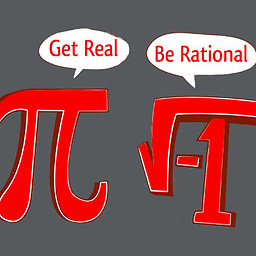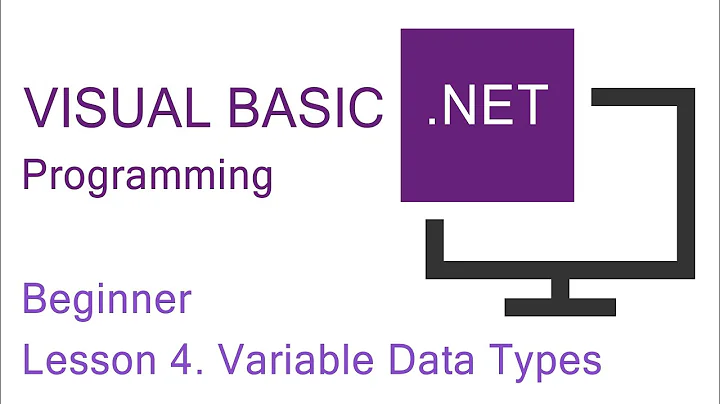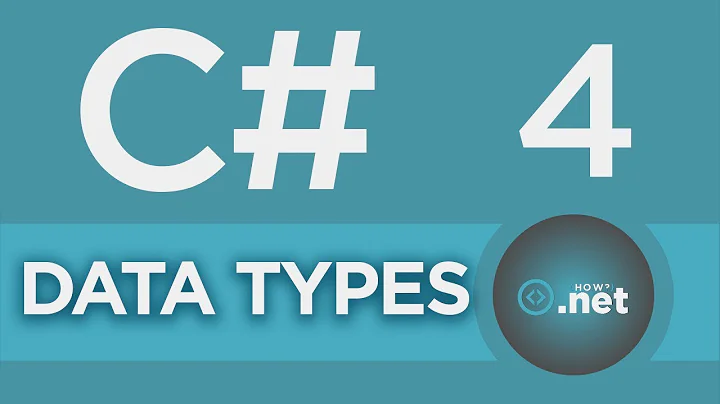C# 4 bit data type
Solution 1
No, there is no such thing as a four-bit data type in c#.
Incidentally, four bits will only store a number from 0 to 15, so it doesn't sound like it is fit for purpose if you are storing values from 0 to 127. To compute the range of a variable given that it has N bits, use the formula (2^N)-1 to calculate the maximum. 2^4 = 16 - 1 = 15.
If you need to use a data type that is less than 8 bits in order to save space, you will need to use a packed binary format and special code to access it.
You could for example store two four-bit values in a byte using an AND mask plus a bit shift, e.g.
byte source = 0xAD;
var hiNybble = (source & 0xF0) >> 4; //Left hand nybble = A
var loNyblle = (source & 0x0F); //Right hand nybble = D
Or using integer division and modulus, which works well too but maybe isn't quite as readable:
var hiNybble = source / 16;
var loNybble = source % 16;
And of course you can use an extension method.
static byte GetLowNybble(this byte input)
{
return input % 16;
}
static byte GetHighNybble(this byte input)
{
return input / 16;
}
var hiNybble = source.GetHighNybble();
var loNybble = source.GetLowNybble();
Storing it is easier:
var source = hiNybble * 16 + lowNybble;
Updating just one nybble is harder:
var source = source & 0xF0 + loNybble; //Update only low four bits
var source = source & 0x0F + (hiNybble << 4); //Update only high bits
Solution 2
A 4-bit data type (AKA Nib) only goes from 0-15. It requires 7 bits to go from 0-127. You need a byte essentially.
Solution 3
No, C# does not have a 4-bit numeric data type. If you wish to pack 2 4-bit values in a single 8-bit byte, you will need to write the packing and unpacking code yourself.
Solution 4
No, even boolean is 8 bits size.
You can use >> and << operators to store and read two 4 bit values from one byte.
Related videos on Youtube
Comments
-
 driconmax 5 months
driconmax 5 monthsDoes C# have a 4 bit data type? I want to make a program with variables that waste the minimum amount of memory, because the program will consume a lot.
For example: I need to save a value that i know it will go from
0to10and a 4 bit var can go from0to15and it's perfect. But the closest i found was the 8 bit (1 Byte) data type Byte.I have the idea of creating a c++ dll with a custom data type. Something like nibble. But, if that's the solution to my problem, i don't know where to start, and what i have to do.
Limitations: Creating a Byte and splitting it in two is NOT an option.
-
 NathanOliver almost 6 yearsThe smallest addressable space is a byte, so no, you can't have a half byte variable.
NathanOliver almost 6 yearsThe smallest addressable space is a byte, so no, you can't have a half byte variable. -
 Daniel A. White almost 6 yearsyou'll have a lot of overhead.
Daniel A. White almost 6 yearsyou'll have a lot of overhead. -
 Joe almost 6 yearsIf you are worried about having so many 4-bit values that you'll exhaust memory, then you are probably trying to solve this problem the wrong way.
Joe almost 6 yearsIf you are worried about having so many 4-bit values that you'll exhaust memory, then you are probably trying to solve this problem the wrong way. -
 crashmstr almost 6 yearsWhat is "consume a lot"? 2 GB? 4 GB? 64 GB? Whatever you are looking at, you are probably thinking about this too soon and/or solving the problem the wrong way.
crashmstr almost 6 yearsWhat is "consume a lot"? 2 GB? 4 GB? 64 GB? Whatever you are looking at, you are probably thinking about this too soon and/or solving the problem the wrong way. -
 driconmax almost 6 yearsI need to save memory from all the places that i can.
driconmax almost 6 yearsI need to save memory from all the places that i can. -
 driconmax almost 6 yearsWhy the downvotes? I just want to know something that i don't...
driconmax almost 6 yearsWhy the downvotes? I just want to know something that i don't... -
 Abion47 almost 6 yearsThere are roughly 100 billion stars in the Milky Way. A standard for RAM in a modern desktop is 8 or 16 gigabytes, which is
Abion47 almost 6 yearsThere are roughly 100 billion stars in the Milky Way. A standard for RAM in a modern desktop is 8 or 16 gigabytes, which is17,179,869,184bytes at the most. Assuming you used nibbles and packed the RAM full of nothing but star data, that still only lets you store about 34% of them, and that leaves nothing for the program as well as other low-priority things such as the operating system itself. I think you should really revisit the scope and requirements of your program. -
 Ahmad Hassanat over 2 yearsThis is an excellent question, I do not know why you guys attacking the asker? yes, you can, just create a class or a struct containing 4 bool variables, and you program its methods such as convert to integer, printing, storing, etc.
Ahmad Hassanat over 2 yearsThis is an excellent question, I do not know why you guys attacking the asker? yes, you can, just create a class or a struct containing 4 bool variables, and you program its methods such as convert to integer, printing, storing, etc.
-
-
 driconmax almost 6 yearsYes, sorry, i mean 0 to 10. Fixing the question now
driconmax almost 6 yearsYes, sorry, i mean 0 to 10. Fixing the question now -
 VoteCoffee almost 6 years
VoteCoffee almost 6 years -
 VoteCoffee almost 6 yearsIf you only need 0-10, you can compact 2 nibs in a byte. But honestly, all of this is bad practice in a managed environment. You should really consider what you're trying to accomplish. Programming in a managed environment really is more concerned with abstraction and decoupling from implementation hardware. If you were looking for the answer in C++ it would make more sense to me.
VoteCoffee almost 6 yearsIf you only need 0-10, you can compact 2 nibs in a byte. But honestly, all of this is bad practice in a managed environment. You should really consider what you're trying to accomplish. Programming in a managed environment really is more concerned with abstraction and decoupling from implementation hardware. If you were looking for the answer in C++ it would make more sense to me. -
 driconmax almost 6 years@VoteCoffee
driconmax almost 6 years@VoteCoffeeLimitations: Creating a Byte and splitting it in two is NOT an option. -
 VoteCoffee almost 6 yearsYou'll likely need to create a helper class to marshall your work into unmanaged code. If you try to roll your own nibble using booleans, then you'll end up using more memory space. Even in the unmanaged environment, memory is addressed at the byte level, so you'll have to create functions to look up half-bytes. It's going to be a lot of work.
VoteCoffee almost 6 yearsYou'll likely need to create a helper class to marshall your work into unmanaged code. If you try to roll your own nibble using booleans, then you'll end up using more memory space. Even in the unmanaged environment, memory is addressed at the byte level, so you'll have to create functions to look up half-bytes. It's going to be a lot of work. -
 driconmax almost 6 yearsSo creating that 4b var, it makes all the work for nothing for the cost that have using it?
driconmax almost 6 yearsSo creating that 4b var, it makes all the work for nothing for the cost that have using it? -
 VoteCoffee almost 6 yearsA managed environment like c# doesn't let you control memory allocation at a low level. Also, for every variable you allocate, it add padding data required for garbage collection. Managed code decouples you from control of memory, threading, etc.
VoteCoffee almost 6 yearsA managed environment like c# doesn't let you control memory allocation at a low level. Also, for every variable you allocate, it add padding data required for garbage collection. Managed code decouples you from control of memory, threading, etc. -
 VoteCoffee almost 6 yearsThere's no code you could write in a managed environment to accomplish what you want. If you wrote a helped application in unmanaged code like c++ and marshalled your work over to it and let it handle the memory and work performed on the memory, you could do it. It would be a lot of work though. Better to just write the code in C++ to begin with.
VoteCoffee almost 6 yearsThere's no code you could write in a managed environment to accomplish what you want. If you wrote a helped application in unmanaged code like c++ and marshalled your work over to it and let it handle the memory and work performed on the memory, you could do it. It would be a lot of work though. Better to just write the code in C++ to begin with.






